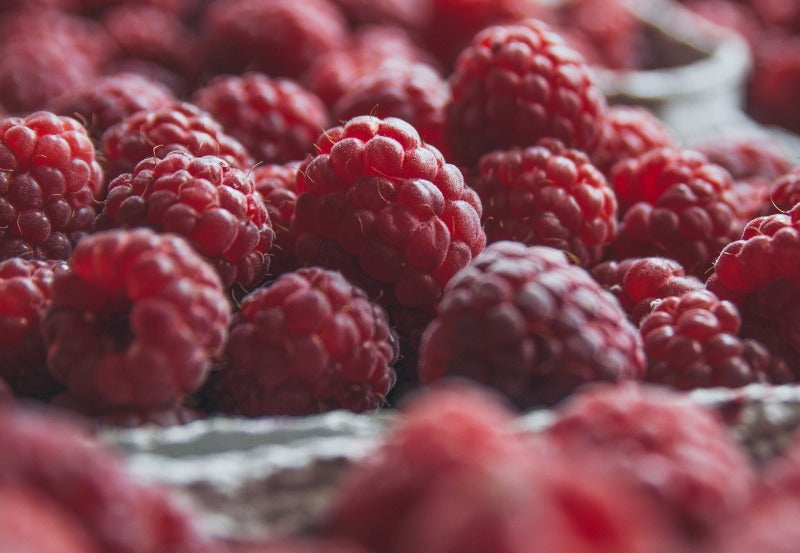With their unique tart and sweet taste, raspberries are wonderful in smoothies, salads, desserts, and on their own. Chances are, if you give your bearded dragon raspberries, she’ll gobble them right up. But just because dragons will eat the berries doesn’t necessarily mean they should. So can bearded dragons eat raspberries safely? Let’s find out if it’s beneficial to give your bearded dragon raspberries.
Can Bearded Dragons Have Raspberries?
Raspberries have a few red flags for bearded dragons:
Oxalates. Raspberries contain about 48 mg of oxalates in one cup, which is a moderate amount. Oxalates and oxalic acid can cause serious health issues for bearded dragons because they bind with calcium during digestion to form calcium oxalate, which can’t be absorbed or utilized by the body. Too many oxalates or too much oxalic acid in your beardie’s diet can cause metabolic bone disease, a condition that severely damages a dragon's bones. MBD is characterized by paralysis, deformity, shrunken limbs, and lethargy. In severe cases it can be fatal.
More phosphorus than calcium. Raspberries have a calcium to phosphorus ratio of 1:1.2, meaning there is more phosphorus than calcium. Similar to oxalates, phosphorus binds with calcium and prevents it from entering the dragon’s bloodstream. If a beardie eats too much food that has more phosphorus than calcium, not only will the phosphorus prevent the calcium in the food from being absorbed, but it can start taking calcium away from the dragon. Over time this can cause metabolic bone disease.
High sugar content. Most fruit has quite a bit of sugar, which in small doses is fine for bearded dragons, but in high amounts can really wreak some havoc. Bearded dragons who eat too much sugar can become obese and develop fatty liver disease, diarrhea, dehydration, diabetes, and tooth and gum decay.

Because of all this, should you just save the raspberries for yourself and avoid giving them to your bearded dragon?
Actually, raspberries don’t have enough oxalates or phosphorus to be completely toxic for your pet. Bearded dragons can safely eat two or three raspberries every few weeks as a treat. Which is good news because beardies love raspberries!
So not only do they make a tasty treat for your beardie (and let’s face it, who doesn’t love treating their special pet?), but raspberries also offer your bearded dragon some key vitamins and minerals:
- Carbohydrates, which provide energy
- Fiber, which promotes smooth digestion
- Vitamin C, which is key for growth, a healthy immune system, vision, reproduction, and organ and tissue maintenance and repair
- Manganese, which aids metabolism
- Vitamin K, which regulates blood clotting and aids in bone and overall health
- Iron, which helps strengthen blood and bones and oxygenates the organs
- Magnesium, which helps maintain healthy blood sugar levels
- Vitamin E, which protects the body’s cells
- Potassium, which regulates blood pressure and nerve function
Raspberries are also 87% water, so they are a great option if your dragon needs a quick boost of hydration.
How Can Bearded Dragons Eat Raspberries?
Like blueberries, raspberries can be fed whole to your bearded dragon. But there are a few pointers to know before you offer them:
Only serve fresh raspberries to your beardie. Aging raspberries, even if they aren't quite rotten, can cause diarrhea and make your dragon sick.
If you are serving frozen raspberries, thaw them first, but don’t serve them warm. Frozen raspberries are safe for bearded dragons to eat and have just about the same amount of nutrients as fresh berries, but they can be a bit messier because they tend to be mushy. Fresh raspberries might be a better option if you want an easier cleanup.
As with all berries, wash raspberries thoroughly and remove any leaves or stems.
Feed the raspberries whole or in pieces in a salad. Like strawberries and blueberries, raspberries can be used (sparingly of course) to coax picky eaters to eat their veggies. Place little pieces throughout your beardie’s salad and you will soon see your beardie chomping on the veggies, too.
Pro Tip: Bearded dragons love raspberries and can get very excited to eat them! To avoid being bitten, don't hand-feed these berries to your pet.
After feeding the berries, be sure to remove any leftover fruit promptly so it doesn’t rot in your beardie’s terrarium.
If your bearded dragon does happen to eat too many raspberries and you notice a runny stool in the next couple days, soak your dragon in a warm water bath for 15 minutes a day and make sure he gets enough hydration. If you aren’t certain the diarrhea is from raspberries or another dietary change, definitely call your vet, since it could be parasites.
As long as you are cautious about how often you feed raspberries and how many, your bearded dragon should be just fine. And maybe she’ll be eating more greens thanks to this tasty fruit!
Got questions or feedback? Please email us at team@dragonsdiet.com








